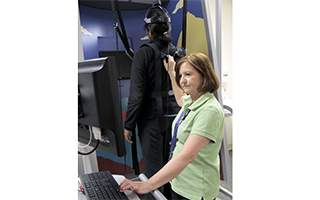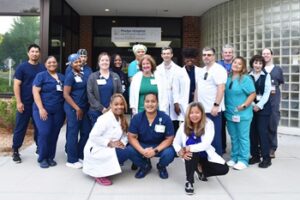 Testing and Rehabilitation Available for Those with Dizziness and Imbalance. Phelps Memorial Hospital Center has recently established the Phelps Balance Center to offer comprehensive testing and rehabilitation for individuals who have problems with dizziness and imbalance.
Testing and Rehabilitation Available for Those with Dizziness and Imbalance. Phelps Memorial Hospital Center has recently established the Phelps Balance Center to offer comprehensive testing and rehabilitation for individuals who have problems with dizziness and imbalance.
Balance problems are among the most common reasons that older adults seek help from a physician. The greatest risk associated with balance problems is falling and fall-related injuries such as hip fractures. Early preventive measure, particularly balance therapy, can reduce the risk of falls and help promote independence. Without preventive efforts, about one third of people aged 65 or older typically fall once or more each year.
There are three main types of balances problems: vertigo, presyncope and disequilibrium. Vertigo is a sense of spinning. Presyncope is a feeling of lightheadedness or feeling faint. Disequilibrium is the sensation of being off balance and is most often characterized by frequent falls in a specific direction.
The new Balance Center utilizes state-of-the-art diagnostic technology to determine the cause of dizziness or imbalance:
Computerized Dynamic Posturography (CDP) with SMART Balance Master equipment, developed by NASA, is used to identify which of the three balance systems is impaired – the auditory system (hearing and vestibular), the sensory system (sense of touch and feel by skin, joints and muscles) or vision.
Videonystagmography (VNG) is a diagnostic test that analyzes eye movements to evaluate the vestibular function in the inner ear. The test shows if a dizziness or imbalance problem is due to an inner ear disorder.
Since hearing and the vestibular system are directly connected, hearing tests are also conducted.
Once the cause of imbalance is identified, the Center’s highly qualified audiologists, occupational therapists and physical therapists develop an individualized treatment plan for each patient.
You might benefit from vestibular rehabilitation if:
You feel dizzy when you:
- Look up
- Bend down
- Turn over in bed quickly
- Get up quickly
- Turn your head quickly
- Walk down a narrow hallway
- Walk in a supermarket aisle
- Recline in a dentist chair
- Are in dim lighting or darkness
You feel dizzy and you recently:
- Were hospitalized
- Had a near/full fall
- Had a head injury
- Had an ear infection
You are not dizzy but you:
- Have trouble with your balance
- Hold onto objects when you walk
- Walk slowly
- Feel wobbly/unsteady in the dark
- Turn your head slowly
- Are cautious and do everything slowly







